|
Born in 1960 to his European mother Joanna
Hubbs, Ph.D. (who is a former Woodrow Wilson Fellow and retired
Professor of Russian and European Cultural History and Literature,
author, and now president and senior editor of Transitions Abroad), and
to Clay Hubbs, Ph.D., the founding publisher and editor of trailblazing Transitions Abroad magazine. Gregory, who is modest and laconic to a fault (insert irony emoji), is fortunate to have traveled and lived abroad for many extended periods. Indeed, his life has been an example of much of what Transitions Abroad has discussed and promoted since its inception — educational, cultural immersion, sustainable, adventure travel, teaching, volunteering, and living abroad.
Early Childhood Abroad
By age four, Hubbs had lived in England for three years and experienced an intense year-long journey. He commenced in 1963, being driven by his fearless parents in a VW bus through various civil wars, coups, and bandit attacks across the countries of North Africa (including the Algerian/Moroccan Sand War) and the Middle East (coups in Damascus and Baghdad). His parents navigated through many marginal roads in the deserts and mountains of Egypt, Jordan, Lebanon, Syria, Turkey & Greece, Iraq, and Iran on the way to India, following the trail of Alexander the Great. Gregory still remembers vividly the incredible hospitality and the smiling faces of so many locals across Mediterranean, North African, and Middle Eastern countries, possessing black and white photos to jog his memory about the unbelievable stories recounted by his parents.
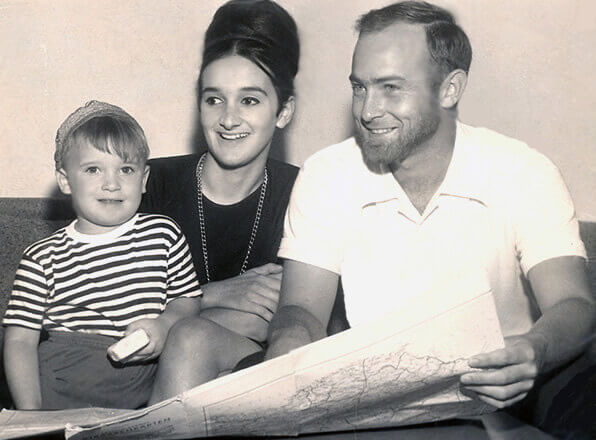
|
Gregory, at age four in 1964, holding a piece of marble perhaps from Roman ruins with Joanna Hubbs and Clay Hubbs during an interview after returning from a year-long trip that started from near the Air Force base where he was stationed in England, near Scotland, where they had lived for three years.
The family took off on an adventure in their VW bus full of canned goods, including spam and chili that we bartered, down through Western Europe, across Northern Africa, the Middle East, and Persia, and back to England through the Eastern Mediterranean for one year. We were following the path of Alexander the Great as described by the ancient Greek historian Herodotus as we had forgotten our likely largely useless maps and had no smartphones and GPS!
Gregory's parents returned to tell many incredible stories about their trip, which he is working with on with his mother to memorialize.
|
Between the ages 8-10, Gregory slowly made his way with his parents through much of Western and Eastern Europe — including several months in the Soviet Union while his mother researched her book on Russian cultural history — in yet another VW bus.
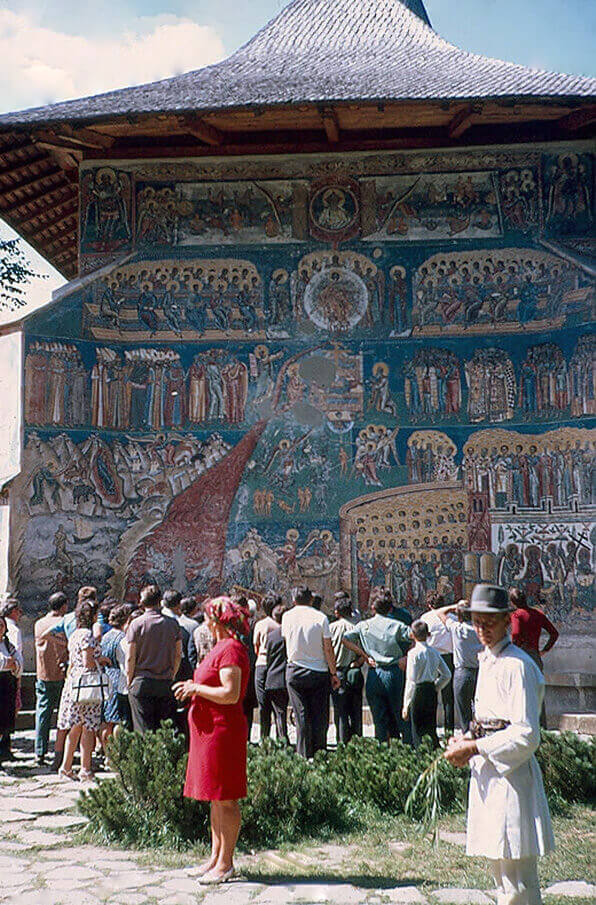
|
A painted Romanian church encountered during our journey through the Soviet Union.
|
He was then sent to a local French public school for a year in 3rd grade near Paris without knowing a word of the language. Such immersion led to memorizing scores of classic poems he still remembers, finishing at the top of his class in math, marbles, and soccer while at the bottom in penmanship.
There, Hubbs lived, by chance, next to the first hippy commune in France, played with their rock band in avant-garde nightclubs in Paris as the drummer to great reviews, met members of the Living Theatre, and came to see and know more than a child his age probably should.
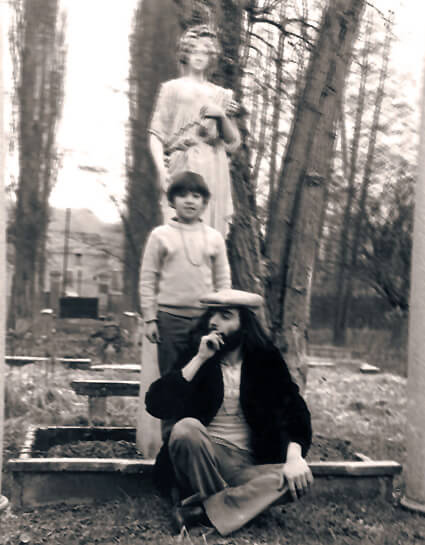
|
Appropriately blurry, hanging out wearing beads with a French hippy who was part of a commune also living on unkept castle grounds near Paris in 1969 — after a year of intense travel.
|
Thanks to his adventurous and well-educated parents, by age 10, Gregory could thus lay claim to having been tugged through more Mesopotamian, Egyptian, Greek, and Roman temple ruins, cathedrals, mosques, and museums than his peers. He had initiated an expansive reading of folklore, mythologies, religious texts, literature, and history that profoundly influenced his future education, imagination, perspectives, and identity as a world citizen.
Teen Years
Abroad
Between 14-15, Gregory attended a French public high school in southern France on the Italian border. He discovered how little he knew and how overwhelmingly friendly students and other locals living on the French Riviera can be to Americans willing to speak and respect their rich language and culture.
At 16, he volunteered to help reconstruct an ancient watermill deep in the French Vaucluse mountains and a castle in Burgundy through a French organization that specializes in the preservation and restoration of heritage sites called REMPART, in the same rugged manner by which they were initially constructed, and based upon the experience, he wrote one of the first articles published by Transitions Abroad magazine in 1977.
When Hubbs graduated early from an American high school in the college town of Amherst, Massachusetts, he spent a semester of cultural immersion study and travel with college students in Toulouse, France. The program included a homestay with a hospitable French family via the Experiment in International Living program. During his free time at ages 17-18, Gregory's imagination was pushed to its limits by his daily work and obsession with the translation of the many visionary and influential Symbolist poems of Charles Baudelaire, Arthur Rimbaud, Stephane Mallarmé, and other French poets idolized by American Beatnik writers, many well-read pop/rock/folk music lyricists, scores of classical music composers, philosophers and essayists, a range of seminal art movements, and as icons to various subsequent literary giants.
Many subsequent years as a high school and college student backpacking with a Eurail
pass through Europe on a meager budget every summer preceded
and ensued with occasional visits to his parents' modest 12th-century
watchtower in Tuscany to work using his otherwise useless muscle for money in return for restoring
tall thick crumbling walls of medieval and even Etruscan origin.
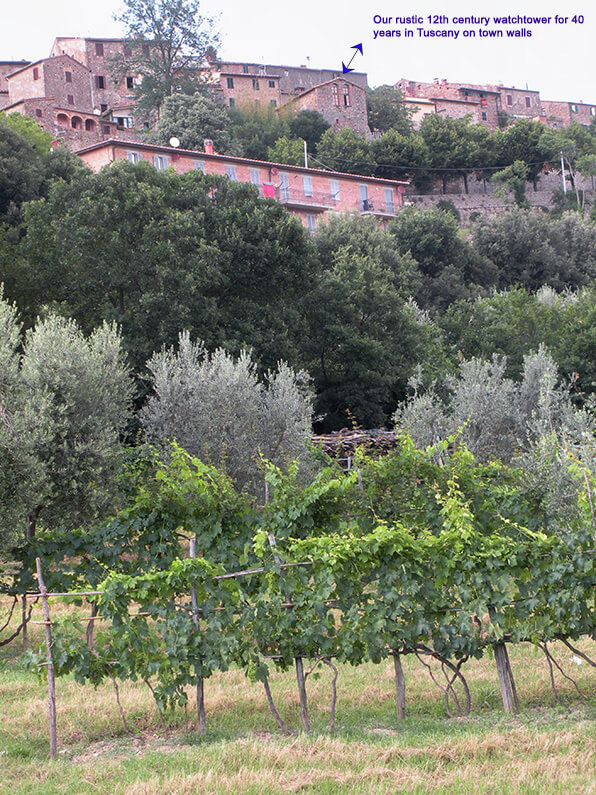
|
Our humble 3-floor watchtower (the bottom floor had been for horses) was on the town walls of a hilltop village in Tuscany near Florence and Siena, overlooking San Gimignano. We had a modest garden full of wild herbs, artichokes, and a fig tree, with views of endless hills, grape vineyards, olive trees, lush green fields, and other Medieval towns.
The tower, whose soul we carefully sought to retain as we restored it, spending as little as possible over 40 years, was built upon ancient thick stone walls. Gregory worked like Hercules for his cheapish father in return for minimal pay that funded many memorable European summer adventures backpacking.
|
Student Years
Abroad
Between the ages 18-22 Gregory enjoyed other summers that included sleeping on a Rome rooftop that overlooked the Castel Sant'Angelo and the skyline of The Eternal City while reading in Italian, listening to the music of Vivaldi, Scarlatti, and Verdi, after memorable days and nights walking through the lively streets and squares eating gelato with Romans at Giolitti.
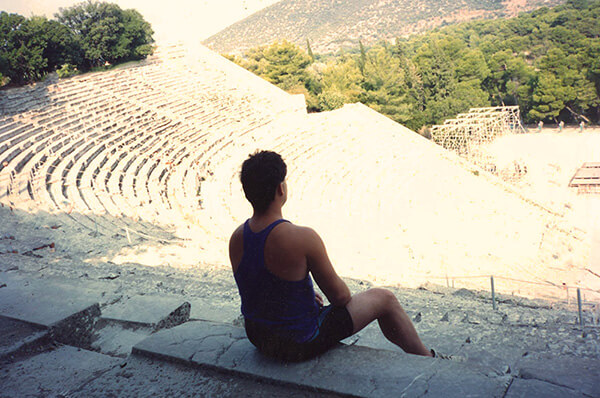
|
|
During one of many odysseys through Greece while a student, on an extremely hot day, Gregory visited the amphitheater of Epidaurus in the Peloponnese.
|
Gregory's academic background includes a bachelor's degree in a self-created curriculum centered on the History of Ideas, an extremely humbling and deliberately challenging interpretative study of various geniuses across the ages. In addition, he wrote his thesis on French Symbolist poetry while at Hampshire College, taking most core classical and modern literature and philosophy courses at Amherst College, Smith College, and Mount Holyoke College as part of the unique and unparalleled Five College Consortium in Amherst, Massachusetts.
Hubbs undertook intensive
graduate studies at the University
of Paris, Sorbonne, in French and Comparative Literature and German Idealist and Existential Philosophy. While living
in Paris, he read voraciously in several languages and visited
museums daily while walking the city.
He attended numerous seminars and talks at the University of Paris, Collège
de France, Institut Catholique de Paris, Science Po, École normale supérieure, and elsewhere with
then-fashionable philosophers and critical theorists such as Michel
Foucault, Jacques
Derrida, and Gilles Deleuze as well as poets/essayists such as Yves
Bonnefoy.
From his diverse education and through the profound influence of his parents and the many famous and even iconic writers, artists, intellectuals, and academic colleagues who came to dine at our house — as my European mother cooked French and Italian cuisine exceptionally well and is blessed with boundless intellectual energy, while my father was a wine connoisseur with a very warm, wise, and witty personality — Gregory was raised as an intellectual with a keen simultaneous sense of idealism, irony, and the absurd. As a result, Hubbs intensely recognizes that our brief time on earth and the opportunities to learn, think, and enjoy life are not for him a motivation for travel as a competition to count countries visited, but rather for cultural adventures, the cultivation of sensitive observations, spontaneous conversations with locals and expats alike, and ever respectful communal celebrations.
Looking Forward
After many years wandering the world solo and en famille, Gregory first studied at University of California, Berkeley Extension and then consulted in Information Technology in San Francisco and New York City, which still allowed for extensive long-term travel and financial freedom but somewhat restrained the desired total immersion in the passionate pursuit of interests overseas while honoring his father's influential work. Now editor-in-chief, he is pleased to travel as much as possible while working with experts in their respective fields, professional travel writers, and contributing freelancers towards continuing the evolution of TransitionsAbroad.com as a premier no-nonsense web publication dedicated to work, study, travel, living, internships, and volunteering abroad.
In 2014, he was honored with an invitation to the Obama administration's initiative to get young Americans to go abroad in greater numbers for a variety of reasons at the White House Travel Summit on Study Abroad and Global Citizenship.
Immensely proud to be the son of Dr.
Clay Hubbs, the founding editor, and publisher of Transitions
Abroad Publishing, Inc. (founded 1977). Gregory Hubbs
assumed the role of web content editor in 2004 and Editor-in-Chief
in 2010. Gregory brings his father's years of visionary
work to a domestic and international audience,
extending the scope of the original mission by
adding his own extensive experience and expertise, which is evolving
from travel and learning at all stages of life.
|
